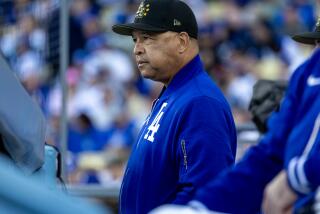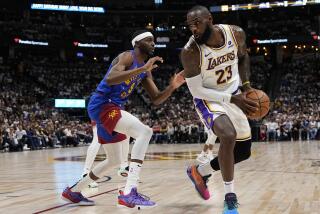Making Up Getting Really Hard to Do
- Share via
Now to find out how big a mess this is . . .
In last week’s surprising thaw, the NBA and its players awoke, as if from a bad dream, to find themselves agreed on the broad outlines of a deal.
Of course, the outlines are very broad, indeed, and the window of opportunity for tripping merrily out of harm’s way at this late date is very small.
Or as one source close to negotiations said: “This week is the moment of truth as far as salvaging games. After this week, it can’t happen.”
Making up lost games--and paying players money the league had insisted was already gone--is the key to a fast deal, rather than one in December or January (or never?), so we’re looking at two scenarios:
Limited disaster--agreement is reached this week. David Stern announces a 74-game schedule starting Dec. 1, meaning players lose 10% of their salaries. Michael Jordan returns. Hunter and Stern are on the cover of Sports Illustrated, hugging and laughing. Everyone goes back to harvesting money by the bale.
Disaster of magnitude still unknown--negotiations stall. Amid bad feelings, talks break off. Players miss Nov. 15 and 30 checks and, unless someone has a miracle conversion, can kiss December’s goodbye, too--almost 33% of their pay. Stern muses again about “drop-dead” dates, Hunter about “decertification.” Jordan retires. The odds on replicating The Baseball Experience drop from 10-1 to 4-1.
At least the choices are clear.
“They’re agreed on a skeleton of a deal,” said the source, “so all they’re talking about now are percentages. At some point, they’ve got to figure out, one side goes down a little, one side goes up a little. That’s going to happen in a few days, unless these guys are idiots.”
The amazing thing is the idiots, er, parties, have come this far this fast. It seems to stem from some back-channel communication between Stern and Hunter last week, when the subject of makeup games was first raised.
Signaling he liked it, Stern began talking of “recapturing” games last Wednesday.
Showing they liked it, Hunter and counsel Jeffrey Kessler, the union’s leading hawk, began pronouncing themselves “optimistic,” noting “significant” progress.
Optimism blossomed. Charles Barkley, who dismissed Stern’s proposal as “crappy” a week ago, told CNBC a new deal would be done in a week. (One thing about having Barkley in your union, management never has to wonder what the membership is thinking.)
What could go wrong now?
Oh, just about anything.
Over the weekend, David Falk, who had been quiet as a fat cat, arose like a wraith on Halloween and starting hurling thunderbolts, demanding the NBA lift its lockout, making veiled suggestions about a new league.
“I’ve got the power to combat whatever starvation tactics the league employs,” Falk told the New York Times in a modest allusion to his client list that includes Michael Jordan, now considered the players’ driving force, union President Patrick Ewing and vice presidents Alonzo Mourning, Dikembe Mutombo and Juwan Howard.
Falk being Falk, one never knows what he’s up to, but rival agents suspect he’s trying to soften the owners or position himself to claim credit if a deal is made, noting he’s in a different place than in 1995.
Since then, Falk signed his five unionists to contracts worth almost $400 million (David’s percentage is $15 million) and sold his practice to SFX Concerts in a deal worth $150 million--assuming his normal revenue stream, which depends on players playing. The surprise will be if Falk really overturns the apple cart.
Nor is the union enjoying Falk’s act. Hunter has already been around and around with him and may have to go again.
“It’s happened in the past,” said a union official, “it’s happened recently and it’ll happen again.”
Then there are those old standbys, emotion and face.
This dispute has little to do with conditions. During the ’96 playoffs, Jordan leaked word he wanted $36 million over two seasons but now makes $33 million annually and is darned if anyone is going to whittle it down without a fight.
Thus began his union period, which reached its high or low point in his shouting match with Washington Wizard owner Abe Pollin.
Pollin, the dean of NBA owners, having bought in for $1.1 million in 1964, prides himself on doing the right thing (building the MCI Center with his money, changing the name from Bullets) but may have read his bio in the media guide (“. . .what distinguishes Abe Pollin from the other genre of sports entrepreneurs is his commitment to social responsibility”) once too often.
Pollin told Jordan in last week’s meeting that players should trust owners, a quaintly paternal notion that other players in the room actually tittered at. Pollin smoldered.
The rest of the exchange reportedly went like this:
Jordan: Why don’t owners take capital appreciation (more than $125-million worth in Pollin’s case) into account before claiming they’re in trouble?
Pollin: How am I supposed to live off my capital appreciation?
Jordan: If you can’t compete, sell your team.
Pollin (under his breath): @#$%^&*! you
Stern: Sit down, Abe!
As an entrepreneur par excellence himself, Jordan shouldn’t be in the position of denying anyone a fair return on his investment, but then the 74-year-old Pollin shouldn’t be acting like a child.
Jordan, bemused at the incident, was totally cool afterward--”I’m not trying to disrespect Abe and I don’t expect him to disrespect us as players, but [if] they’re going to make a hard stand, we have to make a hard stand”--but if he averages 75 the rest of his career against the Wizards, you’ll know why.
Let’s hope for the best. This thing won’t even officially start until Tuesday’s canceled openers and it’s already lasted way too long.
More to Read
Go beyond the scoreboard
Get the latest on L.A.'s teams in the daily Sports Report newsletter.
You may occasionally receive promotional content from the Los Angeles Times.










